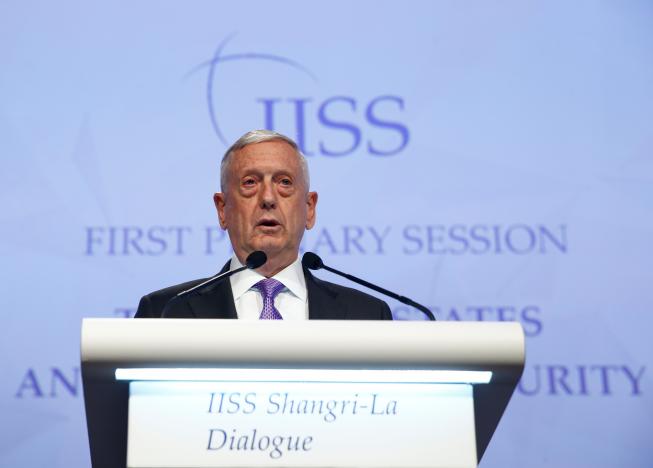“Ultimately, we believe China will come to recognize North Korea as a strategic liability, not an asset.”
However, Mattis said seeking China’s cooperation on North Korea did not mean Washington would not challenge Beijing’s activities in the South China Sea.
The U.N. Security Council on Friday expanded targeted sanctions against North Korea after its repeated missile tests, adopting the first such resolution agreed by the United States and China since Trump took office.
In another sign of increased pressure on North Korea, Japan’s navy and air force began a three-day military exercise with two U.S. aircraft carriers in the Sea of Japan on Thursday.
Japanese Defense Minister Tomomi Inada, speaking at the Singapore forum, said Tokyo backed the United States using any option to deal with North Korea, including military strikes, and was seeking a deeper alliance with Washington.
But she also said she was concerned about the situation in the South China Sea and in the East China Sea.
China’s claims in the South China Sea, through which about $5 trillion in ship-borne trade passes each year, are contested by Brunei, Malaysia, the Philippines, Taiwan and Vietnam. China and Japan both claim islands in the East China Sea.
Read the whole story from Reuters.
Already have an account? Sign In
Two ways to continue to read this article.
Subscribe
$1.99
every 4 weeks
- Unlimited access to all articles
- Support independent journalism
- Ad-free reading experience
Subscribe Now
Recurring Monthly. Cancel Anytime.
“Ultimately, we believe China will come to recognize North Korea as a strategic liability, not an asset.”
However, Mattis said seeking China’s cooperation on North Korea did not mean Washington would not challenge Beijing’s activities in the South China Sea.
The U.N. Security Council on Friday expanded targeted sanctions against North Korea after its repeated missile tests, adopting the first such resolution agreed by the United States and China since Trump took office.
In another sign of increased pressure on North Korea, Japan’s navy and air force began a three-day military exercise with two U.S. aircraft carriers in the Sea of Japan on Thursday.
Japanese Defense Minister Tomomi Inada, speaking at the Singapore forum, said Tokyo backed the United States using any option to deal with North Korea, including military strikes, and was seeking a deeper alliance with Washington.
But she also said she was concerned about the situation in the South China Sea and in the East China Sea.
China’s claims in the South China Sea, through which about $5 trillion in ship-borne trade passes each year, are contested by Brunei, Malaysia, the Philippines, Taiwan and Vietnam. China and Japan both claim islands in the East China Sea.
Read the whole story from Reuters.










COMMENTS